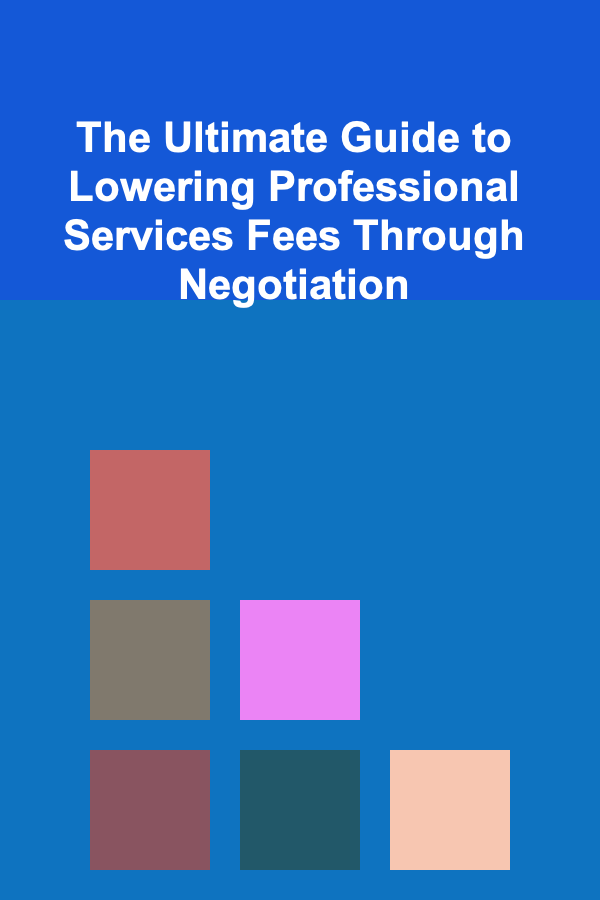
The Ultimate Guide to Lowering Professional Services Fees Through Negotiation
ebook include PDF & Audio bundle (Micro Guide)
$12.99$11.99
Limited Time Offer! Order within the next:

Negotiating professional services fees is a critical skill for businesses, organizations, and individuals who need to manage budgets while maintaining quality service. Whether you're negotiating with consultants, lawyers, accountants, marketing agencies, or any other service provider, mastering the art of negotiation can lead to significant cost savings without sacrificing the value you receive. In this guide, we will explore actionable strategies and techniques that can help you lower professional services fees through effective negotiation.
Understand the Value Proposition
Before jumping into any negotiation, it's important to understand the value proposition the service provider is offering. Professional services, especially those in fields like law, consulting, or specialized IT services, can be costly due to the expertise and experience required. However, understanding the specific value they bring to your organization will give you the leverage you need in negotiations.
Steps to Understand the Value Proposition:
- Assess the Scope of Services: Identify the exact deliverables and outcomes you are expecting. Be clear about what you need, and ensure the service provider knows this too.
- Evaluate the Provider's Expertise: Research the qualifications, experience, and reputation of the provider. If they are a specialist in a niche area, they may command higher fees, but their expertise could justify the cost.
- Analyze the Market Rate: Look at industry standards to determine whether the provider's fees are in line with the market. This will help you gauge whether there's room for negotiation.
- Identify Areas for Flexibility: Determine which aspects of the service can be adjusted or scaled down to meet your budget without compromising the outcome.
By having a thorough understanding of what the service provider offers, you will be able to pinpoint areas where you can negotiate without affecting the overall quality of the service.
Build a Strong Relationship
Successful negotiations are built on relationships, not just on rigid terms. Establishing a strong rapport with the service provider can create a more collaborative environment, where both parties are more willing to compromise.
How to Build a Strong Relationship:
- Be Transparent About Your Budget: Openly discuss your budget constraints from the beginning. Professional services providers are more likely to offer discounts or flexible pricing when they know your limitations.
- Establish Long-Term Collaboration: Service providers often offer better rates to clients with whom they have ongoing, repeat business relationships. If you anticipate needing their services again in the future, this can be a powerful bargaining chip.
- Focus on Mutual Benefits: Emphasize the potential for long-term success, referrals, or a positive testimonial. Service providers appreciate clients who are happy to promote their work.
Building trust and demonstrating that you value the service provider's work can make them more amenable to offering a better rate or finding creative ways to lower the cost.
Leverage Volume or Bundling
Many service providers offer discounts for clients who provide larger volumes of business or commit to multiple services. If you plan to engage with the service provider on a consistent basis, it's worth negotiating for a lower rate by bundling services or committing to a long-term agreement.
Negotiation Techniques:
- Volume Discounts: If you anticipate needing ongoing services, propose a larger commitment. For example, a company that hires a marketing agency for one project may pay full price, but a company that commits to a quarterly retainer might receive a discount.
- Bundling Services: Offer to bundle multiple services with the provider to get a discount. If you are hiring an accountant for tax services, see if they can offer a discount on payroll processing or other accounting services.
- Package Deals: Ask if there are standard package deals that could offer more for less. Many professional service providers have predefined packages that could be cheaper than negotiating services à la carte.
Providers often find value in securing larger projects or ongoing relationships, so offering to provide them with more business may lead to cost reductions.
Compare Multiple Providers
One of the most powerful tools in negotiation is competition. Having multiple options on the table gives you leverage in negotiating lower fees. It also helps you identify the best service providers who offer the most competitive pricing for the value they deliver.
How to Use Competition to Your Advantage:
- Request Quotes: Get quotes from several providers before committing to one. This will give you a clearer sense of the market rate and will allow you to compare prices and service packages.
- Be Transparent About Your Research: When negotiating, mention that you are considering multiple providers and that you're looking for the best value. Be respectful, but let the provider know you're committed to finding a deal that works within your budget.
- Highlight Differences: If one provider offers a slightly higher rate but with superior experience, mention this to the others. They may be willing to match or beat the price to win your business.
Having multiple bids allows you to negotiate with confidence, knowing you have alternatives if one provider isn't flexible on price.
Negotiate Payment Terms
Price isn't the only negotiable aspect of a contract. Service providers may be willing to lower their fees if you're flexible with payment terms. By negotiating the timing or structure of your payments, you can often find a more cost-effective arrangement.
Payment Term Strategies:
- Upfront Payments: Offer to pay a portion of the fee upfront. Service providers may be willing to reduce the overall cost in exchange for the security of upfront payment.
- Milestone Payments: Instead of paying the full fee upfront or at the end, propose milestone payments tied to deliverables or specific phases of the project. This structure allows the provider to feel more secure while potentially lowering the immediate financial burden.
- Discount for Early Payment: Some service providers may offer discounts if you agree to pay before the due date. It's worth asking if such discounts are available.
- Payment Flexibility: If your organization has a strict payment schedule, see if you can extend the terms or negotiate a longer repayment period. In some cases, this may enable the provider to offer you a reduced rate in exchange for longer-term payment commitments.
Negotiating flexible payment terms can reduce the total amount paid over time and ease cash flow concerns for both you and the provider.
Offer Non-Monetary Incentives
Not all negotiations need to revolve around price alone. Sometimes, offering non-monetary incentives can make the deal more attractive to the service provider without necessarily lowering the price.
Non-Monetary Negotiation Tactics:
- Exposure and Referrals: Offer the provider exposure to your audience or referrals to new clients in exchange for a better rate. Service providers, especially smaller ones, often value the opportunity to build their client base.
- Marketing or Testimonials: Offer a testimonial or case study that highlights the value the provider delivered. Positive reviews and case studies can help providers gain credibility and new business.
- Flexibility on Terms: In exchange for a lower fee, offer the provider flexibility in other areas, such as scheduling or the scope of services. For instance, if you're willing to be flexible on timelines, the provider may be able to adjust pricing accordingly.
Non-monetary incentives can be especially effective for providers who are trying to grow their business or reputation.
Be Willing to Walk Away
Lastly, one of the most powerful negotiation tools is the willingness to walk away. If you've done your research and have found competitive alternatives, don't be afraid to walk away if the terms are not favorable. Service providers are more likely to offer a discount or improved terms when they see you're prepared to explore other options.
How to Walk Away Tactfully:
- Be Respectful: Even if you decide not to move forward with the provider, maintain a respectful tone and leave the door open for future opportunities. You never know when you might need their services again.
- Mention Other Options: If appropriate, let the provider know you've found a more cost-effective solution elsewhere. This information can encourage them to reconsider their pricing.
- Don't Rush: Take your time in the negotiation process. If you feel rushed, it may be tempting to accept the first offer. Take the time to evaluate your options thoroughly.
Walking away from a deal can be difficult, but it can also lead to better pricing and terms when the provider realizes they might lose your business.
Conclusion
Negotiating professional services fees is both an art and a science. By understanding the value proposition, building relationships, leveraging competition, and being strategic with payment terms, you can significantly reduce the fees you pay for professional services without compromising on quality. Remember, successful negotiations are about finding a win-win solution where both parties feel they've achieved a fair deal. Keep these actionable strategies in mind, and you'll be better equipped to negotiate lower professional services fees and maximize your business's bottom line.

Best Organization Tools for Personal Goal Setting
Read More
How to Create a Yearly Maintenance Plan for Your Home
Read More
How to Organize Household Chores for Seniors
Read More
How to Organize Your Home Library for Easy Access to Books
Read More
How to Plan for Retirement While Budgeting
Read More
How to Use the KonMari Method for Effective Tidying
Read MoreOther Products

Best Organization Tools for Personal Goal Setting
Read More
How to Create a Yearly Maintenance Plan for Your Home
Read More
How to Organize Household Chores for Seniors
Read More
How to Organize Your Home Library for Easy Access to Books
Read More
How to Plan for Retirement While Budgeting
Read More